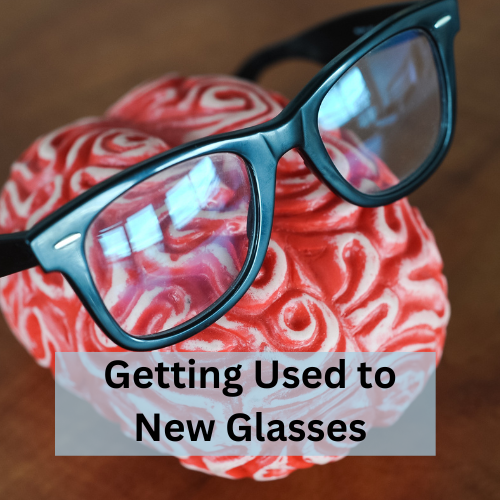Adapting to New Glasses


Adapting to new glasses may take some time and here’s what how the brain may be adjusting.
When you get a new pair of glasses, the visual cortex, which is the part of the brain responsible for processing visual information, needs some time to adjust to the changes in the way light is refracted by the lenses. This adjustment period is commonly referred to as the adaptation or adjustment period.
Here’s a step-by-step explanation of the process of adapting to new glasses:
Putting on the new glasses:
When you first put on your new glasses, the lenses refract light differently than your old glasses or your uncorrected vision. This means that the images reaching your retina are now clearer, but they might appear different due to changes in magnification, distortion, or other factors.
Initial visual sensations:
Initially, you may experience sensations like a sense of distortion, warping, or even mild dizziness. This is because your brain is not accustomed to the new visual input.
Brain adaptation:
The visual cortex is incredibly adaptable. It constantly adapts to changes in visual input to optimize vision. As you wear your new glasses consistently, the visual cortex starts to adapt to the altered visual signals. This involves changes in the way neurons process and interpret the information coming from the eyes.
Neuroplasticity at work:
Neuroplasticity is the brain’s ability to reorganize itself by forming new neural connections. During the adaptation period, the visual cortex is engaged in neuroplasticity, essentially rewiring itself to accommodate the changes in visual stimuli. This allows your brain to make sense of the new visual information and improve your perception through the new lenses.
The adjustment period:
The adjustment period varies from person to person. Some individuals may adapt quickly within a few hours or days, while others may take a week or more. It’s common to notice gradual improvements in visual comfort and clarity during this time.
Follow-up appointments:
If you experience persistent discomfort or vision issues, it’s important to communicate this to your eye care professional. Sometimes, minor adjustments to the prescription or lens design may be needed.
Gregory Scimeca, M.D.
Ophthalmologist and Medical Director
The Eye Professionals
Our Locations
